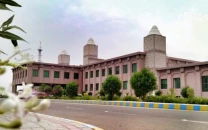When every paisa counts, the post office takes its pound of flesh
The delivery mechanism for this landmark social welfare project needs to be fixed, say experts.

If post offices demand Rs100 from women who are recipients of the Rs1,000 of the Benazir Income Supprt Programme, what will be left?
This point and other snags in the delivery mechanism were discussed at an advocacy workshop on the “Issues and Challenges in Benazir Income Support Programme (BISP)”. The event was organised by BISP partners, the Participatory Development Initiative (PDI) in collaboration with Oxfam Great Britain and the European Commission, at a hotel on Wednesday.
The project
Newly appointed project consultant Jamal Mustafa Shoro provided insights to the workings of BISP as well as the findings of a recent survey on who should be a recipient of the BISP. The project takes a targeted approach of providing subsidies to women from the lowest income group. The survey was based on focus groups and unstructured interviews, questionnaires and the ‘poverty score card’.
The poverty score card is a World Bank creation in which respondents answer 13 multiple-choice questions, with each option having a pre-determined score. The questions revolve around assets and expenditure. The answers are fed into a software that calculates their cumulative score, with those scoring from one to eleven classified as extremely poor.
The Rs1,000 that they get, however, falls drastically short of the Rs2,550 - calculated on a dollar a day earning - that is required to stay above the poverty line. On average, the Rs1,000 is divided by a family of six, coming down to Rs167 per person. This is a mere 6.5 per cent of the required amount.
Pandora’s box
“The major problems are the identification and selection of beneficiaries (of BISP), lack of coordination between government tiers and political favouritism,” says Shoro. Initially, all Members of Provincial Assembly (MPA) were given around 8,000 forms to distribute in their constituencies, which meant that most MPAs gave away the forms to their own people, says Shoro.
There have been complaints against the delivery mechanism too. “They are about the deductions made at the post office, as the postal service is used to distribute the money. The post office personnel demand Rs100 to Rs200 from each beneficiary.” Shoro says that this practice has become institutionalised with even the higher-ups involved.
Going off track
A question and answer session followed, in which representatives of the development sector, economic experts and government officials shared their thoughts and ideas. But as Shoro later pointed out to The Express Tribune, the discussion veered off the topic as it became focused on skill development. Several participants felt that the Rs1,000 could create a sense of inferiority in the recipients and make them aid dependent. Another key suggestion was to conduct impact assessment.
“The focus should have been on how to improve the delivery mechanism and how to ensure that the money reaches the recipient as those are the core issues,” he said. Shoro also clarified that the BISP was envisioned as supplementary income and not income in itself. “What do you get in Rs1,000?” Shoro also clarified that the BISP was envisioned as a supplementary income and not income in itself. The lack of concrete data was another question that went unanswered. BISP did not provide the total amount allocated to the project or the amount earmarked for recipients.
The expert panel
Post Master General (PMG) Karachi Ali Ehsan Farooqui, while acknowledging the problem of corruption and mismanagement, failed to mention if there is any strategy to counter it and if any action has been taken against errant post masters. Instead, he enumerated the problems of the postal service.
Mohammad Sabir, the senior principal economist at the Social Policy and Development Centre (SPDC) suggested exploring the potential of tourism, citing the example of Thar. “By training the locals in the basic skills of hospitality, we can help them earn their own livelihood.”
BISP General Secretary Ghulam Qasim Bughio acknowledged the problem of corruption of the postal service as well as with the MPAs. But even he failed to provide any solution. “We have distributed the Benazir Smart Card in Sanghar, which serves as an ATM card, and introduced phone banking in Larkana,” he said.
Taj Haider, the Pakistan Peoples Party Sindh general secretary, said on a concluding note that the BISP will have the desired impact.
Published in The Express Tribune, June 9th, 2011.


















COMMENTS
Comments are moderated and generally will be posted if they are on-topic and not abusive.
For more information, please see our Comments FAQ